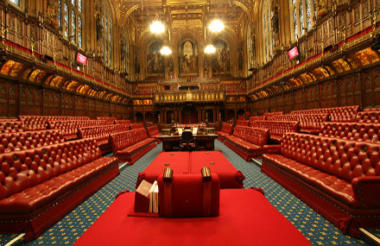The Charity Commission has emphasised its independence from government in response to a new report, which raises concerns over the appointments of regulatory leaders.
Published today, the Industry and Regulators Committee’s report says that the appointments of regulatory leaders are sometimes hampered by political interference, undermining the independence of regulators.
It cites the appointments of Tina Stowell as chair of the Charity Commission in 2018 and Orlando Fraser in 2022 despite the relevant select committee not endorsing either candidate.
Stowell was a Conservative peer when controversially appointed to chair the regulator while Fraser previously ran as a Conservative candidate.
In its submission to the Industry and Regulators Committee, the Commission wrote: “Independence – not just from government, but from our regulated community and other stakeholders – is one of our core regulatory values.”
The committee’s report says: “Many regulators were keen to stress their independence from the government.
“In practice, however, the level of independence of the UK’s regulators varies, and there are concerns in some quarters at the government’s ability to interfere in some of their operations.
“Where regulators are insufficiently independent, or perceived as such, it undermines their ability to regulate objectively, free from undue political influence and accountable to the public interest.
“This results in a loss of trust on the part of both consumers and regulated entities.”
Some regulatory appointments reflect ‘political loyalties’
The committee received oral and written evidence from 15 of the UK’s regulators, including the Commission.
On the appointment of regulatory leaders, the report says: “We’re concerned at the perception that the appointment and reappointment of some regulatory leaders reflects their political loyalties more than their suitability for the role.
“Similar concerns apply where senior staff or board members haven’t been reappointed because of differences with the government of the day.
“Given these concerns, it would be desirable for select committees to play a greater role in scrutinising public appointments to regulatory positions.
“While some regulatory appointments are subject to pre-appointment hearings and scrutiny, this isn’t the case for all appointments and varies between regulators.
“It’s also concerning that the government has taken regulatory appointments forward in cases where the relevant select committee has refused to endorse a candidate.”
The report also criticises the delays of appointments to regulators’ boards, saying that they impact the governance of regulators and make these positions “less attractive”.
Charity Commission: ‘Independence is among our core regulatory values’
A spokesperson for the Charity Commission said in response to the report: “We welcomed the opportunity to provide evidence to the committee as part of this inquiry, and will consider the resulting report with interest.
“As our submission to the inquiry emphasises, independence – both from government, and the sector we regulate – is among the commission’s core regulatory values.
“This is central to our ability to regulate in a way that inspires public trust and confidence in the charity sector in England and Wales.
“Our independence is reflected in our non-ministerial status, protected by law, and upheld in our relationship with our sponsoring department.”
Regulators face resourcing challenge
The report also says that some regulators do not have sufficient resources to carry out their functions in an effective way and urges the government to consider granting them powers to raise revenues.
Unlike some other regulators, the Commission negotiates its annual funding settlement with the Treasury.
The report reads: “Some regulators can raise their own revenues through levies and charges. However, others depend on the government for their funding. Those funding decisions inevitably influence regulators’ ability to carry out their functions independently.
“We’re concerned that a number of regulators appear not to have sufficient resources to carry out their existing functions effectively, while others have had their responsibilities extended without an increase in resources to match.
“Regulators cannot regulate efficiently and effectively without adequate funding, which in turn risks hampering the success of the industries they regulate.”
The report adds that several regulators are facing staff shortages due to current funding regimes and payscales and should be allowed “greater discretion” to move outside of those.
“Even where regulators have revenue raising powers, they can still find it challenging to recruit staff with the skills they need because of the higher pay on offer in the private sector, particularly in relation to digital and technological skills.”
Related articles












